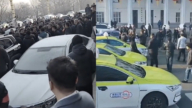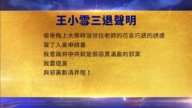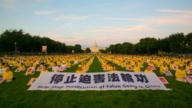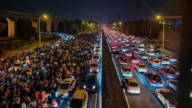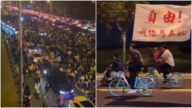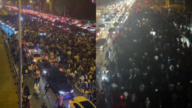【新唐人2013年01月05日讯】2012年,没有如玛雅人所预言的出现世界末日,但是对中国民众而言,却如末日般的黑暗—-中共贪官吞地强拆、城管暴力行凶、公检法贪赃枉法、暴力截访迫害访民、残酷镇压示威群众等等,数不胜数的流血事件不断在大陆各地上演着。原本中国民众还对十八大抱有一线希望,期盼着新政府会有所改变,但是当残酷的现实摆在眼前时,绝望使他们彻底的觉醒了。
近年来,中国大陆各地每天都发生数百起的群众事件。据不完全统计,仅2010年,就发生群众事件十八万起,并且这个数字还在逐年翻倍递增着。尤其2012年,中共日益高压的统治和政府官员的极度腐败,使中国民众的积怨到达了前所未有的顶峰。于是各地爆发了诸如警民冲突、藏人自焚、杀官袭警、围攻政府、万人上访、大型示威游行等“官逼民反”类型的事件。
随着“十八大”的召开,对生活现状近乎绝望的中国百姓,把仅有的希望寄托在中共的新领导班子上,期待着他们能够做出改革,惩治腐败。但是,在中共新政底下,当局颁布网路实名制、对网路举报视而不见、各地更加嚣张的贪官、元旦数千访民被捕…,这些在在浇灭了中国百姓心中最后一线希望之火,绝望使民怨彻底沸腾起来,忍无可忍的百姓们纷纷走出家门,用各种方式加入示威、抗暴、反腐败、反压迫的行列中去。
中国宪政学者陈永苗:“ 现在的国家领导人,他已经是在一个腐烂钢铁大机器里面一个比较大的螺丝钉,他已经没有办法带动这个大机器的良性循环了。 这国家根本就是没药可救了。”
仅仅元旦前后,全中国就发生了十几起重大的群众事件,其中包括:2012年12月30号,云南临沧数百村民冲上公路,抗议官员侵吞卖地款,遭武警镇压;2012年年底,湖南洪江市兴建水电站,强迫2万5000农民搬迁,五天内四农民自杀抗议;而,东莞数千民工包围派出所,与数百警察对峙,只为了因工伤抢救不及时的四川民工讨个公道;2013年元旦,湖南邵阳城管暴力执法,打伤司机,现场数千群众怒砸执法车等等。
湖南司机刘先生:“已经麻木了,因为看多了吧,这种事情。这是这个体制害人,就是形成了一个恶性循环。反腐我不相信了,真的要反复,整个只要是当公务员的,全都是贪官!没有一个是清廉的。我不听他宣传,我要看到事实。”
与此同时,全国各地的访民前仆后继的涌向北京,明知道等待他们的只有截访、抓捕、关押、迫害,甚至是劳教判刑,访民们依然豪不退缩的坚持一次次的上访,然后被关押,放出来继续上访,甚至有访民不得不用生命来捍卫自己的权益,就在1月3号,一位来自陕西的老访民绝望之下闯天安门,打算跳城楼自尽。
《六四天网》负责人黄琦: “他们需要向各界说明,在中共大陆民众的冤苦没有地方申诉,所以他们不得不采取跳楼、自杀等一切激烈的手法,应该说民众的这种情况,并不是他们自己愿意这样做的,他们是被逼无奈走上了这条路。”
四川成都的“中国天网人权中心”(《六四天网》)负责人黄琦说,在漫长的上访过程中,中国访民们终于认识到,中国大陆的许多问题不仅仅是个人问题,而是整个社会的普遍问题。而恰恰是现有的社会制度造成了这些社会问题和矛盾,现在访民们和觉醒的中国民众,不仅想要解决他们自己的问题,更想要改变整个社会和现有的体制,甚至是推翻这个一党专政的政权。
采访/朱智善 编辑/张天宇 后制/ 王明宇
China’s Mass Protests Surge During 2013 New Year’s Day Holiday
The rumored “end of the world”
did not happen at the end of 2012.
However, people living under the rule of the
Chinese Communist Party (CCP) seem to have reached the end of their tether.
Why? They face land grabbing and forced
evictions under corrupt CCP officials;
violent enforcement of rule by law
from urban management officers;
and mafia-style interception of petitioners, as well
as repression of protesters by local authorities.
Bloody police-civilian clashes are
incessantly staged nowadays in China.
These harsh realities have now awakened
Chinese people who originally placed a glimmer
of hope in the new CCP leadership changing.
In recent years, hundreds of mass protests
have occurred every day across China.
Incomplete statistics show that in 2010 alone, China saw
180,000 mass protests, with numbers growing yearly.
In 2012, Chinese people’s grievances peaked, oppressed
by high-handed CCP rules and official’s extreme corruption.
Nationwide incidents erupted, including police-civilian
clashes, Tibetan self-immolations, murder of CCP officials,
attacks on police, and mass besieging city halls.
China also saw petitioning involving over 10,000
people, as well as large-scale demonstrations.
Along with the 18th Party Congress being held, Chinese
civilians pinned their last hope on the new CCP leadership
to launch reforms and punish corruption.
However, in reality, the new CCP administration has
quickly put the internet ‘real-name system’ into practice.
Online disclosure of corruption and scandals
involving CCP officials were glossed over.
Thousands of petitioners across China
were arrested during 2013 New Year holiday.
This harsh reality has now forced more Chinese
citizens to join the protests against the CCP tyranny.
Chen Yongmiao: “Now the CCP regime’s leader
is just a big cog in a large rotten machine.
He has no way to make the machine run
smoothly, for the regime is completely incurable.”
During the 2013 New Year’s holiday, over
a dozen mass protests occurred in China.
This included on December 30, when hundreds
of Yunnan villagers protested against local officials.
The local officials were embezzling land-sale revenues,
but protesters were repressed by armed police.
In Hunan, the CCP authorities in Hongjiang
city forced 25,000 farmers to relocate,
to make way for a hydroelectric station project.
Within five days, four farmers committed
suicide to protest against this policy.
In Guangdong, thousands of migrant workers
besieged a police station in Dongguan.
This resulted in a confrontation with hundreds of police.
The mass siege was to seek justice for
a Sichuan migrant worker who was injured
at work, and died due to a delayed rescue.
On New Year’s Day 2013, an urban management
squad in Shaoyang, Hunan province, wounded a driver.
The act outraged thousands of local residents
who smashed a law enforcement vehicle.
Mr. Liu, driver from Hunan: “I have become numb
about such news, for I’ve seen too many already.
It’s the existing political system that victimizes
the public, which finally forms a vicious cycle.
I don’t believe the official touting of anti-corruption at all.
But I believe that all civil servants are all corrupt.
Not one single official is incorruptible in China. I’ve
never listened to its propaganda, I just believe the reality.”
During the New Year holiday period,
nationwide petitioners flocked to Beijing.
They risked being intercepted, arrested,
detained, and even being jailed.
These petitioners simply continued their
petitioning after release from custody.
Some even risked their lives to
defend their own rights and interests.
On January 3, in desperation, an elderly
petitioner from Shaanxi, tried to end his
own life by jumping from Tiananmen Tower.
Huang Qi, Director, China Tianwang Human Rights Service:
“They’re just telling the world that in the CCP-ruled China,
people have no channel to resolve their grievances.
They’re forced to resort to every extreme method,
including jumping from a building or committing suicide.”
Huang Qi says that in their long process of petitioning,
China’s petitioners have finally come to understand a reality.
That is, lots of problems in China are not only
of individuals, but are common to the whole society.
It is the existing social establishment that
has created these problems and conflicts.
Huang Qi reveals that currently, China’s petitioners and
the awakened citizens continue to defend their own rights.
They also attempt to help change the social establishment,
and even to help overthrow the one-party dictatorship.


